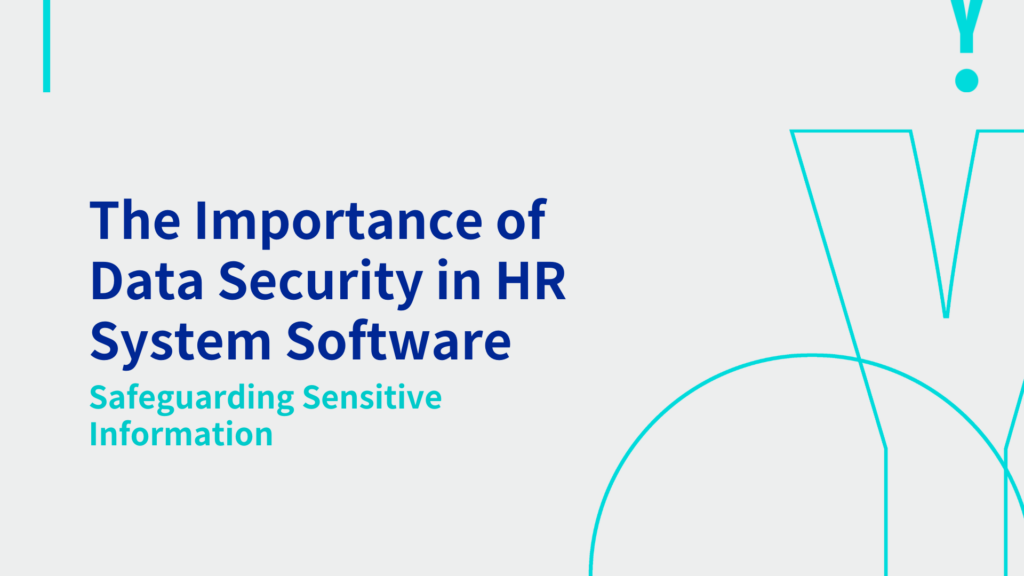
HR software manages enormous volumes of financial as well as employee data in the current digital era. Protecting this information is paramount. Employees trust organizations with their sensitive details, and breaching this trust can have devastating consequences. Moreover, a single data breach can result in financial losses, legal complications, and reputational damage.
HR system software manages payroll, performance reviews, and personal records, making it a prime target for cyberattacks. Data security safeguards ensure compliance with laws like GDPR and also protect against growing cyber threats.
With the increasing reliance on technology, HR departments must prioritize robust data security protocols. After all, ensuring data security isn’t just about compliance; it’s about maintaining employee trust and organizational integrity.
Let’s delve deeper into why data security is non-negotiable in HR software.
The Basics: What Is Data Security in HR System Software?
Data security in HR software involves protecting sensitive employee information from unauthorized access, theft, or misuse. Modern HR systems store vast amounts of personal data, from social security numbers to banking details. So, without robust security, this data remains vulnerable to cyberattacks.
Organizations must implement encryption, access controls, and secure authentication protocols. These measures prevent unauthorized individuals from accessing or tampering with sensitive information.
Additionally, HR software vendors often integrate compliance features for regulations like GDPR or HIPAA. Therefore, by understanding data security basics, businesses can lay a solid foundation for protecting employee information.
When you think about it, safeguarding human resources information systems is about creating a culture of security within your organization. Hence, everyone plays a role in maintaining data integrity.
The Consequences of Poor Data Security in HR
Non-Compliance Can Cost You
Failure to secure HR data can lead to severe legal repercussions. Regulations like GDPR impose hefty fines on organizations that mishandle sensitive information.
Imagine losing substantial revenue due to non-compliance fines—it is not worth the risk.
Moreover, lawsuits from affected employees can escalate costs further. Legal battles drain resources and damage your organization’s credibility. Therefore, by prioritizing security, you’re avoiding unnecessary legal headaches and protecting your bottom line.
Trust Takes Years to Build
A data breach can shatter the trust employees and stakeholders have in your organization. Therefore, rebuilding that trust takes significant effort and time.
Think about it—how many employees would feel secure knowing their data wasn’t adequately protected?
Reputation is everything in today’s competitive job market. Prospective employees and partners often evaluate your data security practices before committing to working with your organization. Hence, don’t let poor security practices tarnish your image.
Data Breaches Could Be Expensive
Cyberattacks can cost companies millions in recovery efforts, legal fees, and operational downtime. Investing in data security measures can save significant expenses in the long run.
Beyond immediate costs, consider the long-term impact on productivity and morale. Employees who feel their data is at risk may disengage, affecting overall performance.
Key Features to Look For in Secure HR Software
Encryption for Locking Sensitive Data
Encryption ensures that data is unreadable to unauthorized users. Even if a hacker gains access, encrypted data remains useless without decryption keys. Modern HR system software uses advanced encryption algorithms to secure information both at rest and in transit.
Hence, through achieving proper encryption for sensitive data, you can create a barrier that deters cybercriminals. Ask your vendor about their encryption standards—it’s a critical factor in evaluating software security.
Role-Based Access Control to Limit Permissions
Not all workers require access to private HR information. Role-based access control allows you to assign access levels based on job roles. For example, payroll specialists might access salary information, while recruiters only see applicant details.
This feature minimizes the risk of insider threats and ensures data is only accessible to those who need it. Regularly reviewing access permissions also helps maintain security.
Regular Updates to Stay Ahead of Threats
Cyberattacks frequently start with outdated software. Therefore, choose the best HR software provider, YOOV that offers regular updates and patches. These updates address vulnerabilities and improve overall functionality.
Although it is simple to ignore updates, they’re crucial to keeping a safe workplace. Set reminders to ensure your systems stay current.
Secure Authentication for Strengthening Logins
Multi-factor authentication (MFA) adds an extra layer of security by requiring additional verification methods, such as SMS codes or biometrics. This reduces the likelihood of unauthorized access, even if passwords are compromised.
Encourage employees to embrace MFA—it’s a small step that makes a big difference. Combine this with strong password policies for optimal protection.
How The Best HR Software Vendors Ensure Data Security?
Continuous Monitoring with Proactive Threat Detection
Top HR software vendors monitor systems 24/7 to detect and mitigate potential vulnerabilities before they escalate. Continuous monitoring ensures threats are addressed promptly, reducing the risk of major breaches.
Therefore, by choosing a vendor with proactive monitoring, you’re gaining peace of mind knowing your data is constantly protected.
Data Backups to Safeguard against Loss
Regular data backups ensure critical information remains intact during cyberattacks or system failures. Choose vendors with secure backup solutions.
Imagine losing years of employee records due to a ransomware attack. Backups provide a safety net that ensures business continuity. Ask your vendor about their backup frequency as well as recovery processes for a sustainable HR management system.
Compliance Certifications for Proof of Reliability
Look for software providers with industry-recognized certifications like ISO 27001. These certifications demonstrate a commitment to stringent security standards.
Certifications aren’t just badges—they’re proof that a vendor takes data security seriously. So, don’t hesitate to ask for documentation.
Training & Awareness: Equip Your Team
Many breaches result from human error. HR software vendors often offer training programs to educate users on safe data handling practices. From avoiding phishing scams to recognizing suspicious activity, these programs empower employees to be the first line of defense.
What’s Next for HR Data Security?
- AI-Powered Securuty
Artificial intelligence is revolutionizing cybersecurity by detecting patterns and predicting potential threats before they occur. AI-driven tools analyze vast amounts of data, thus, identifying anomalies that could indicate a breach.
Therefore, by integrating AI, organizations gain an edge in staying ahead of sophisticated cyberattacks. It’s like having a digital watchdog monitoring your systems 24/7.
- Enhanced Transparency
Blockchain offers a decentralized method for securing data, moreover, ensuring tamper-proof records and improved transparency in HR processes. This technology is particularly beneficial for payroll and employee verification.
Adopting blockchain can enhance trust between employees and employers, thanks to its secure and transparent nature.
- Biometric Authentication
Biometric technologies like fingerprint scanning or facial recognition are becoming standard features in secure HR software. These methods offer a higher level of security compared to traditional passwords.
Imagine unlocking HR systems with just a glance—it’s convenient and highly secure. Biometric authentication is paving the way for seamless security.
- Zero Trust Model
The zero-trust approach ensures strict identity verification for every user, even those within the organization, reducing insider threats. This model treats every access request as potentially risky, ensuring robust security at every level.
Final Thoughts
Data security in HR software is not just the IT department’s job; it’s a shared responsibility across the organization. Employees must be vigilant, vendors must prioritize security, and HR leaders must advocate for robust measures.
Investing in secure HR system software is an investment in your organization’s future. Protecting employee data ensures compliance, builds trust, and also safeguards against costly breaches. As cyber threats evolve, staying proactive and informed is the best defense.
What steps will you take today to enhance your HR data security?
Share your thoughts with our experts at YOOV and let’s prioritize your organization’s security together.
Connect with YOOV

Tel:+852 2988 8883
WhatsApp:Click Here
Email:cs@yoov.com
Website:https://www.yoov.com/